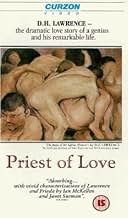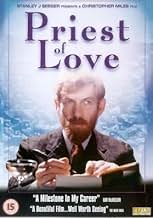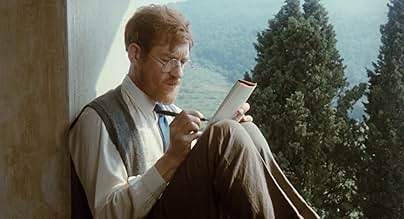अपनी भाषा में प्लॉट जोड़ेंFollowing the banning and burning of his novel, "The Rainbow", D.H. Lawrence and his wife, Frieda, move to the United States, and then to Mexico. When Lawrence contracts tuberculosis, they r... सभी पढ़ेंFollowing the banning and burning of his novel, "The Rainbow", D.H. Lawrence and his wife, Frieda, move to the United States, and then to Mexico. When Lawrence contracts tuberculosis, they return to England for a short time, then to Italy, where Lawrence wrote "Lady Chatterley's ... सभी पढ़ेंFollowing the banning and burning of his novel, "The Rainbow", D.H. Lawrence and his wife, Frieda, move to the United States, and then to Mexico. When Lawrence contracts tuberculosis, they return to England for a short time, then to Italy, where Lawrence wrote "Lady Chatterley's Lover".
- निर्देशक
- लेखक
- स्टार
- Dr. Uhfelder
- (as Mike Morris)
फ़ीचर्ड समीक्षाएं
I might have remembered that Mr. Lawrence had written 'Lady Chatterley's Lover' had I been pressed for an answer at a quiz, but other than that I knew very little about him at all and might even have assumed that D. H. might have stood for Dorothy Helen without looking it up, so ultimately it was interesting to learn more about the literary great.
And while the story wasn't particularly rife with extraordinary events happening throughout, the authors life and character were still intriguing, especially to me, as a rookie novelist.
Lawrence was obviously an intelligent man and creative, but with a flair for a reverse extravagance, in the way that he shunned things and money, but still enjoyed the life that they brought. He appeared to be of a mind like my own, in respect to how literature should be a real representation of life and that sex is a part of that to be acknowledged and enjoyed.
In that lead role Ian McKellen was as superb as ever and he played it with great personality. Whether he was accurately depicting the real Lawrence or not, I could not say, because I knew so little about him, but the performance certainly sparked an interest in reading his complete works and perhaps even a biography of the man.
There were a lot of homosexual suggestions regarding Lawrence's connections with other men, but nothing definitively depicted. If he did have dalliances with men, for the sake of accuracy and for my own enjoyment, I would have liked to have seen it represented. As a gay man, it is nice to have my lifestyle acknowledged in cinema and to see that some of the greatest minds have felt the same way too. It builds on my own aspirations.
And I would have liked to have seen a lot more of Jorge Rivero (Tony Luhan) and Massimo Ranieri (Piero Pini), if you know what I mean.
The other actors all seemed to deliver their roles well too, perhaps with the exception of Penelope Keith, who although she was fine, in her part of The Honourable Dorothy Brett, it was a bit like Margot Leadbetter* had given up Surbiton and finally understood the appeal of Tom and Barbara's more adventurous nature, but she was still essentially the same character. We all knew that her and Gerry were swingers anyway. All those bowls in her house to swap keys in.
I've digressed.
Although the story didn't move anywhere specific in particular, it was still a pleasure to watch. I was initially a bit worried that the film wouldn't live up to my expectations, because I really do enjoy a good biopic provided the person is worthy, but Mr. McKellen certainly brought life to this one.
719.59/1000.
*'The Good Life' (1975-8).
Christopher Miles did a wonderful adaptation of "The Virgin and the Gypsy" 10 years before he made this film. He certainly is a scholar of Lawrence and a talented filmmaker, so why was this film so charmless and seem so shallow.
I will give a couple of reasons: First, I saw the 99 minute recut of the film. I imagine/hope that the apparently lost original 125 minutes was less choppy and jumpy.
Second, Ian McKellan was a terrible choice for the lead. He simply was too much of a stage actor at this point of his career and he plays most scenes for the the benefit of the baloney.
Third, the beginning shows Lawrence having a nude swim with a homosexual lover. The rest of the movie is about his love affair with his German wife. It is just confusing and undercuts the rest of the movie as we expect him to run off and leave his wife for a man at some point.
Fourth, the movie portrays Lawrence as a one dimensional lone victim of censorship, surely there were other writers being censored at the time and many powerful people supporting his rights to freedom of speech. Making the censor a buffoon (played dully by John Gielgud) doesn't help, but seems to trivialize the issue.
Fifth, Miles may have been to close to the material. He wants to give us a lot of factual information about Lawrence, but the history lesson feels like a history lesson, and there is little dramatic tension. Janet Suzman as Frieda Lawrence seems to carry the weight of whatever dramatic tension there is.
The movie does have nice cinematography. However all the movies adapted from Lawrence's work also have great cinematography and much better characters and stories.
It is therefore perhaps not surprising that after the war Lawrence and Frieda decided to leave Britain and to lead a peripatetic existence wandering around the world, a journey that would take them to France, Italy, Australia, Mexico and the USA. They did so partly because Lawrence needed a warmer climate for the sake of his health- he was suffering from the tuberculosis that would eventually kill him- but the way in which he had been treated in the UK must also have been a factor. The film follows them on their journey and also deals with the writing of Lawrence's last and most controversial novel, "Lady Chatterley's Lover", compared to which "The Rainbow" is about as racy as a children's nursery rhyme.
Although the film features some major names of the British cinema and a bona fide Hollywood goddess in the shape of Ava Gardner, it seems to have aroused little attention. It was not a success on its release in 1981, and I had never heard of it before I recently caught it on television. I note that mine is only the third review of it on this site which suggests that few other people had heard of it either.
And the reason nobody seems to have heard of it is that, frankly, it is not very good. Probably the best acting comes from John Gielgud in a cameo as the pompous Herbert G. Muskett, the reactionary functionary charged with protecting the British people from exposure to literature and who seemed to take a particular delight in persecuting Lawrence. None of the other cast members, however, stand out. Although the title hints at Lawrence's passionate nature, you get little idea of this from Ian McKellen's surprisingly passionless performance. Janet Suzman's Frieda seems too unsympathetic, with the sort of cinematic German accent more normally associated with Nazis barking "ve haff vays und means". Both these performances came as a disappointment to me, because both McKellen and Suzman have been much better in other films.
The screenplay was based upon a non-fiction biography of Lawrence, not always the best source to use when making a fictionalised biopic. The resulting film is just a tedious drawn-out chronicle of two people, one of them seriously ill, journeying around the world, with various artistic and literary celebs from the 1920s occasionally popping up. ("Oh look! Is that Aldous Huxley over there? And could that be Katherine Mansfield? Quick, or else you'll miss her"). Screenwriter Alan Plater and director Christopher Miles might just as well have tried to film the entry on Lawrence from the Encyclopaedia Britannica. Had they done so the result could hardly have been duller than what they actually came up with. 4/10
Picture opens in 1924 with Lawrence (Ian McKellen), wife Frieda (Janet Suzman) and their friend Dorothy Brett (Penelope Keith) en route to Taos, New Mexico, for a self-imposed exile at the house of art patroness Mabel Doge Luhan (Ava Gardner). Back in Britain his books have been banned by the censor, Herbert Muskett (an effectively stern cameo by John Gielgud).
In a typical scene, Lawrence becomes irrational at a party and out of control, slaps Frieda around violently and breaks all the dishes, causing a speedy departure from Taos. Also characteristic is couple's unsympathetic decision to send Dorothy away. Amongst flashbacks detailing economically Lawrence's youth in Cornwall, Miles emphasizes the duo's sojourn in Italy at a villa in Florence provided by a new patron, Angelo Ravagli (Maurizio Merli). Lawrence writes "Lady Chatterley's Lover" there, with impressive care for detail in footage shot at the same Italian printing press where the book was first printed.
Key scenes involve the fearless duo pushing relentlessly for the truth in a sexual manifesto in literature (establishing Frieda as D. H.'s literary collaborator) and tasteful scenes indicating his bisexuality (with a youth nude bathing at an Italian seashore), plus relentless selfishness in inviting Dorothy to bed and then spurning her suddenly.
Dominated by pastoral landscape photography, pic lacks a dramatic edge, with D. H.'s battle from afar with the censor and his impending death by tuberculosis carrying little impact. Coda has Rapagli replacing the deceased Lawrence in Frieda's life and a happy ending for the life-loving survivors, whose joyous celebrations comically extend to absent-mindedly leaving Lawrence's coffin behind at the train station.
Director Miles and actor McKellen create a Lawrence who engages one's intellectual sympathy and is an arresting multi-dimensional figure (even given to an hilarious Gielgud impersonation mocking the censor), but whose selfishness and physical manhandling of Frieda clearly cut off a viewer's emotional support for the character. Too infrequently seen in films, McKellen gives a bravura performance, all the more remarkable for its avoidance of easy empathy. Veteran of a one-woman show on stage as Frieda, Janet Suzman is given her head by Miles and turns in a flamboyant, explosive turn which prevents the film from being dominated by McKellen.
Supporting cast is well-chosen with Ava Gardner looking great and utterly convincing in her best role in years as duo's free-spirited American connection. British comedienne Penelope Keith is the spitting image of her real-life counterpart, but Miles has not curbed her natural comic bent in what should be a straight role. Amongst minor players, Mexican matinee idol Jorge Rivero is well-used as Gardner's sexy young husband, while Italian singer/heartthrob Massimo Ranieri is similarly appropriate as a virile young stud.
Working with stunning locations, Miles and lighting cameraman Ted Moore produce a series of spectacular deep-focus compositions, and wisely present the flashback material in sharp, luminous visuals rather than the cliche of soft-focus. Although Miles adopts a stately pace, he and editor Paul Davies use quick cutaways at the emotional highpoints of scenes, a device which acts to distance the audience from the characters. Joseph James' romantic musical score is good.
After leaving England the movie has the Lawrences landing in Taos, New Mexico where they were closely associated with the wealthy patron of the arts Mabel Dodge Luhan and the artist Dorothy Brett. In exchange for the original text of "Sons and Lovers" Dodge gave them a 160 acre ranch outside of Taos--a ranch that is now known as the Lawrence Ranch. The British artist Dorothy Brett lived on the ranch with the Lawrences, in a separate dwelling. Here is where the weakness of the movie started to become apparent to me and that is the lack of motivation for behavior. What was the basis of the Lawrence's relationship with Brett that resulted in their being close enough to come to the United States together and live on the same ranch.
The motivations for the various moves from country to country are not well established and the transitions are confusingly abrupt. Maybe what prompted the moves were no more than whims, but without any notice the Lawrences were all of the sudden in some place in Mexico, or some place in Italy, or some other place in Italy, on in Capri, or France. The same goes for the people in their lives. How did they ever get to know Mabel Dodge, or any of the other famous people that drifted in and out of their lives? There was no identification of these people beyond sometimes being given their names. For example, while in England we see the Lawrences socializing with John Middleton Murry and his paramour Katherine Mansfield, the latter not even being identified. People would suddenly appear, taking me some time to figure out who they were, like Lawrence's sister Ada. There were scenes that had Aldous Huxley visiting the Lawrences in Italy with the primary interaction between Huxley and Lawrence being over Huxley's painting an external wall lamp. Surely some relevant dialog could have been inserted there.
Ian McKellen gives a good performance as Lawrence, but even at that we get only a hint of an understanding of this complex man--I think I came away with a better understanding of Frieda than of her husband. We get only a hint of Lawrence's homosexual tendencies from an early scene that has him frolicking naked on the beach with a young friend. Dorothy Brett is portrayed as being a grinning simpleton. For her to have been a close friend to the Lawrences, surely there was more to the woman than what we see here.
Of course time is devoted to the writing and publication of "Lady Chatterley's Lover." The music accompanying these scenes is so irritatingly over the top, I suppose to emphasize the significance, that it would be more suitable for Henry's victory at Agincourt.
Some time is spent on Lawrence's efforts at painting in his last years, with the paintings in his exhibition in London being seized and the show closed down. Some of these paintings can now be seen at the La Fonda hotel in Taos. If you ever have a chance to see them, you will be convinced that it was best for Lawrence to devote his talents to writing. To call them erotic paintings, at least at this late date, is more than an overstatement.
I suppose this movie broke some ground as being a major commercial movie that had full frontal male nudity and, as McKellen notes with pleasure in his interview on the extras, it is the first commercial movie to portray an erect penis, albeit as a shadow on a wall.
I saw this in its original release in 1981 and have looked forward to seeing it again on DVD. The "director's cut" now on DVD has been edited from the original 125 minutes to 99 minutes. My memory is not good enough to remember exactly what was cut (I do remember a scene involving Lawrence's ashes that is no longer there), but what remains on the DVD I think is more disjointed and confusing than what was in the original. The cutting is puzzling, getting at an understanding of this complicated man demands a longer movie rather than shorter.
Perhaps the most positive result of seeing this movie would be to encourage you to read Lawrence's writings.
क्या आपको पता है
- ट्रिवियाThis movie was released on the 51st Anniversary year of the death of author D.H. Lawrence.
- भाव
Herbert G. Muskett: [looking at a copy of Lawrence's book "Kangaroo"] It does not appear to be obscene in absolutely legal terms. Anti-British to the point of insanity.
Clerk to Herbert G. Muskett: Apparently, Mr. Lawrence is going to America.
Herbert G. Muskett: We must inform the authorities.
Clerk to Herbert G. Muskett: It's been attended to, Mr Muskett.
[reaching for the book]
Clerk to Herbert G. Muskett: Shall I take this?
Herbert G. Muskett: Leave it. I shall read it again. To make absolutely sure
[recommences intense study of the book]
- इसके अलावा अन्य वर्जनAn abridged 99 minute "Centenary version" was released in 1985 in the UK to better box office and critical acclaim to commemorate the birth of D.H.Lawrence. As well as inevitable cutting of some material the shortened version also rearranges the placement of some of the flashback sequence and ends with Lawrence's death excluding the New Mexico epilogue. The short version is a properly re-prepared effort however with the appearance order end-credits redone to reflect the new positions in which characters first appear. Copies of the 1981 version, which was first released in the UK during the 1982 Falklands War when theatre going plummeted, now no longer exist.
- साउंडट्रैकThe Way We Get It Together
music by Francis James Brown and Stanley Joseph Seeger (as Joseph James)
Lyrics by Christopher Cone
Played by The Pasadena Roof Orchestra
टॉप पसंद
- How long is Priest of Love?Alexa द्वारा संचालित
विवरण
इस पेज में योगदान दें



































